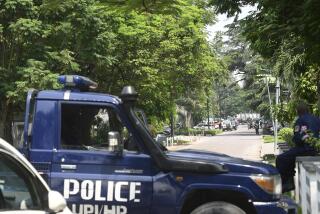Probe of S. Africa Killings Set; Peace Talks Hopes Rise
- Share via
JOHANNESBURG, South Africa — The killing of 28 African National Congress supporters by black homeland soldiers last week appeared Saturday to have done what four months of demanding and mudslinging from all sides had failed to do--nudge ANC leader Nelson Mandela and President Frederik W. de Klerk back to the discussion table.
A Mandela-De Klerk summit moved a step closer to reality Saturday when De Klerk asked South African Judge Richard Goldstone to conduct an urgent probe into the killings in Ciskei, a nominally independent homeland created by apartheid.
Goldstone, head of an independent commission investigating violence countrywide, has earned the respect of both the ANC and the government. And his panel has grown in size and influence in recent months.
De Klerk’s move was a tacit acknowledgment by the government that the investigation being conducted by Ciskei officials would be insufficient to meet the demand for a thorough inquiry. Ciskei’s military ruler, Brig. Gen. Oupa Gqozo, is a close ally of Pretoria. And the Ciskei soldiers who opened fire on the ANC demonstrators last Monday were under the command of white officers on loan from the South African army.
A Mandela-De Klerk meeting, their first round of one-on-one talks since April, would officially discuss the violence in the country. But analysts believe it could well break the ice between the ANC and the white government, easing tensions in the country and clearing the way for a resumption of constitutional talks.
The ANC had conditionally agreed to De Klerk’s request for a summit with Mandela to discuss violence and ways out of the impasse in constitutional negotiations. Among other things, the ANC wanted an independent investigation of the Ciskei massacre.
No date has been set for a summit, but ANC Secretary General Cyril Ramaphosa and De Klerk’s constitutional affairs minister, Roelf Meyer, are meeting to discuss ways of ensuring that such a summit would be a success.
Mandela, the 74-year-old ANC president, and De Klerk are the two most important players in South Africa’s future, and their past meetings have cleared seemingly insurmountable obstacles in the negotiations process.
The two leaders have spoken on the telephone several times in the past five months, and have exchanged lengthy, often angry public letters. The relationship between Mandela and De Klerk has deteriorated in recent months, with Mandela questioning the sincerity of De Klerk’s reform promises and De Klerk suggesting that militants have taken over the reins of the ANC.
Yet both men remain committed to negotiations in principle, and millions of South Africans view them as the last, best hope for the country’s future.
The Goldstone Commission will begin hearings on the Ciskei killings in 10 days, and the judge said he wants to have his findings on De Klerk’s desk by the end of September. The report also will recommend steps that can be taken to prevent a recurrence of the tragedy in Ciskei’s capital, Bisho.
Goldstone noted that a substantial number of independent observers, including journalists and members of the National Peace Secretariat, were present during the events in Ciskei. And he called on television camera operators to make their videotapes available for the commission’s inquiry.
The Goldstone Commission, with De Klerk’s permission, also strengthened its investigative powers Saturday. The judge appointed 26 lawyers, police officers and soldiers to head five special investigative units that will report directly to his commission. In the past, Goldstone’s commissioners have had to rely heavily on investigative work done under the direction of the police and army. Now it has its own independent investigative team.
More to Read
Sign up for Essential California
The most important California stories and recommendations in your inbox every morning.
You may occasionally receive promotional content from the Los Angeles Times.













